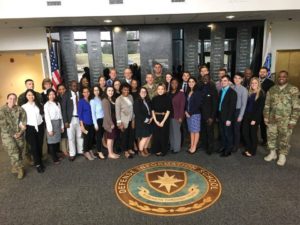Getting Ahead In Your Career: The Alumni Speak

The Public Diplomacy master’s class of 2016-2018 will be graduating in the next few weeks. Like their contemporaries in other courses in the Newhouse School, the biggest preoccupation of these students is to find that job (although maybe not the job of their dreams for starters). Most of them that I have spoken to at this point just want to get a ‘foot in the door’. In order to help prepare them to get the most out of their remaining last semester in Washington DC, a Public Diplomacy panel of alumni working in the field was arranged for them. The nuggets of wisdom that were shared during the discussion would certainly be useful to graduates across a broad sector of fields. Let me share with you some of the key messages I took away from the conversation:
Use the alumni networks: As cliché as this sounds, it was emphasized several times by most panelists. This requires reaching out and setting up coffee chat appointments with alumni who might be in fields of your interest. In order to locate such alumni, you might need to talk to a few lecturers as well as the office responsible for alumni relations in the school. Since you are reaching out to busy people, be prepared to send a follow-up email if your initial one does not get a response. One alumni actually said she got all 3 of her past jobs via networking without even having to respond to any advertisements. I too have experienced the power of networking. I got my summer internship at UNICEF Headquarters in New York through a former Newhouse student. I got my current internship at Internews in Washington by reaching out to the Vice-President of the organization after her presentation to Public Diplomacy students at a workshop. You may along the way never get responses from some of the emails you send out. Do not let that frustrate you. Keep on networking. You never know when you will hit the jackpot.
Be open-minded: You should always come out of university with your dream job in mind but most likely, it will not be your first job. For your first job, you might have to throw away your script and be ready to start at a particular entry level spot and build from there. You must start from somewhere. It is much easier to move from one job to the other rather than from having nothing.
Keep learning: Your graduation should not be the end of your learning career. You must continue learning in order to make yourself competitive in the job market and also to enhance your value at your workplace. As part of your key considerations when deciding on which employer to pick among various options, inquire about the institution’s investment programs for the employees seeking to learn new skills. If your job is so busy to the point that physically attending classes is difficult, look for online and weekend classes.
Be nice to people: The professional space in places like Washington Dc is small. If you have a foul attitude or are difficult to work with, it is very easy for people to find out about you. It is as if everybody knows everybody who is in their field in DC somehow because of the many networking opportunities, which exist. Thus, it is important to be warm and courteous at all times. Even in that pub, you never know who might be serving you those drinks. She or he might just be the person you will find on your next job interview panel. I personally do know a person who works for the Whitehouse and has an extra gig at a local pub, and a high ranking Booze Allen executive who runs a piano lounge near Georgetown University where he tends to customers at times.
Handling the immigration process: Most international students find this process to be very taxing and frustrating. The best way to do things is to start addressing matters related to your continued stay in the USA early enough before you graduate. Some employers do not like employing foreigners because of not wanting to foot the cost of the visa-related paperwork. You might need to engage such an employer and offer to pay for the immigration-related paperwork. Further, sometimes you might need to go back to your country as the paperwork is being processed.
Aaron Mwewa is a final year student in the Public Diplomacy Program currently based in Washington DC.